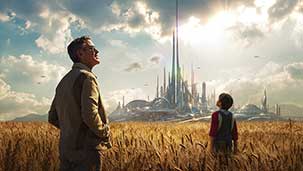When your primary intention in making a film is advocating for a specific political viewpoint, you’re no longer making art, you’re making a piece of propaganda. That isn’t necessarily a negative. There is some Soviet-era cinema chock full of overt political intentions that works just fine. In the case of Tomorrowland, however, it is a poisonous way to go.
Your film concerns itself with our species’ impending, self-inflicted, apocalypse. More specifically, it is about how that apocalypse might be averted, if only those of us who still remember how to dream can find common cause. As an elevator pitch I have heard worse, but during the trip from the elevator to the screen it seems that the movie got “Lindeloffed”.
George Clooney and Britt Robertson (he is a broken, cranky, inventor genius, she is a young, cranky, inventor genius) don’t ever connect with each other, or the audience. And the story itself is poorly told, relying on hackneyed plot devices and almost cartoonishly one-dimensional character types. These are just the most obvious indications of how Tomorrowland was influenced by a man who once wrote Nash Bridges episodes. (I’m looking at you Damon.)
But it is also true—at least for you, Brad—that most of your earlier movies were already teetering on the edge of this kind of polemic scolding. Iron Giant and The Incredibles especially weren’t particularly subtle about their political leanings—a weird mix of exceptionalism and finger wagging about the dangers of the Military Industrial Complex. They were redeemed by their charm and an earnest commitment to story that muted some of the more irritating evangelizing.
The most egregious example of Tomorrowland’s failure as an entertainment is how transparent its creator’s intentions are. Every beat of the story is telegraphed in a way that makes the whole project inevitable, and in the dullest way possible. It’s a tricky enough thing to lace a story with ‘meaning’, but when half the writing team is someone responsible for things like Prometheus and Cowboys and Aliens it becomes an impossible task.
Another irritating byproduct of this kind of clunky narrative is that the characters flatten out and become gossamer thin. What comes out of their mouths is driven by expositional need. There is no depth to their portrayal because they are just mouthpieces, rather than people with their own inherent contradictions and idiosyncrasies. Even Tomorrowland itself is less an aspirational destination than it is a leaden and uni-dimensional MacGuffin that drives the plot.
Hugh Laurie is the only one of the cast that manages to imbue his character with something resembling complexity and that is because, like all British actors, he can say one thing while very clearly meaning something else entirely. Every other character is little more than a wind-up automaton. Except the robot—who is, oddly, the most unpredictable character.
Tomorrowland’s failure may have been inevitable in some ways. I remember reading one critique of The Incredibles that pointed out its could be read as a little authoritarian and elitist. I scoffed but it was a scoff that secretly lacked conviction. Unfortunately, in this film those minor themes have become pre-eminent. In fact, Tomorrowland is so weirdly upside down that Hugh Laurie gives a lengthy speech in the third act of the film—a monologue that is supposed to be his manifesto of E.V.I.L.—that turns out to be the most heartfelt, genuine, and true moment in the film.
Finally, the movie concludes with an overtly manipulative visual that looks like a mash-up of a Socialist Realist Poster and a Benetton ad from the early 2000s. It felt like a moment born in a boardroom much more than an earnest expression of hope. And there is nothing worse than subverting genuine hopefulness in the aid of cynical ends.
You have a lot of splainin’ to do, Mr. Lindelof and Mr. Bird
A lot.
Sincerely,

Tim






